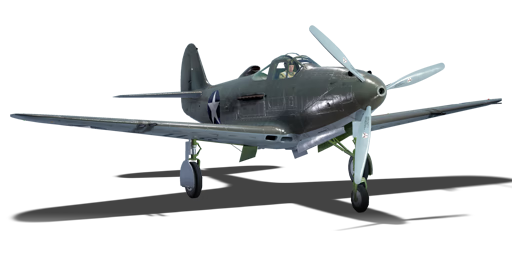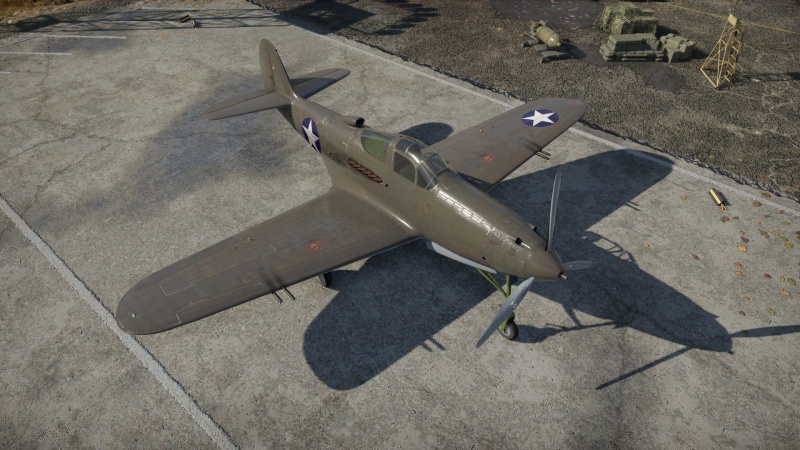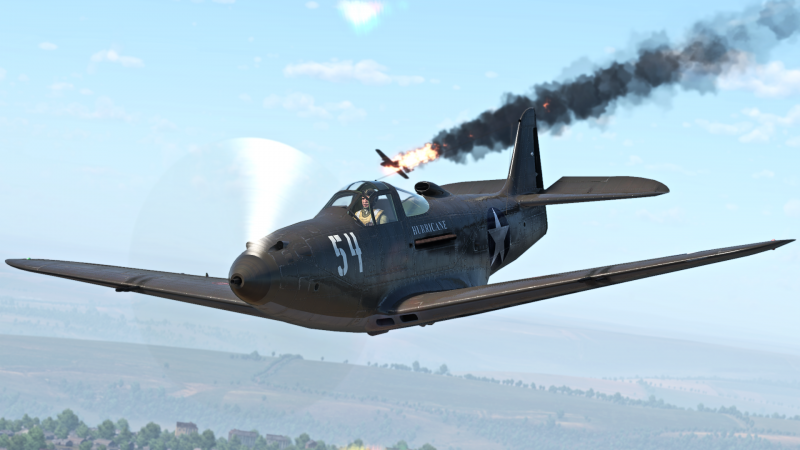P-39N-0
| This page is about the American fighter P-39N-0. For other versions, see P-39 (Family). |
Contents
Description
The P-39N-0 Airacobra is a rank American fighter with a battle rating of (AB), (RB), and (SB). It has been in the game since the start of the Open Beta Test prior to Update 1.27.
The primary purpose of a P-39 is that of a low-level interceptor. It lacks the high-altitude performance required to engage strategic bombers or high-flying fighters, but is extremely competitive under 4,000 m and easily one of the best planes at its BR.
General info
Flight performance
| Characteristics | Max Speed (km/h at 3,048 m) |
Max altitude (metres) |
Turn time (seconds) |
Rate of climb (metres/second) |
Take-off run (metres) | |||
|---|---|---|---|---|---|---|---|---|
| AB | RB | AB | RB | AB | RB | |||
| Stock | 612 | 592 | 19.1 | 19.9 | 10.6 | 10.6 | 280 | |
| Upgraded | 675 | 641 | 16.9 | 18.0 | 21.1 | 14.9 | ||
Details
| Features | ||||
|---|---|---|---|---|
| Combat flaps | Take-off flaps | Landing flaps | Air brakes | Arrestor gear |
| ✓ | ✓ | ✓ | X | X |
| Limits | ||||||
|---|---|---|---|---|---|---|
| Wings (km/h) | Gear (km/h) | Flaps (km/h) | Max Static G | |||
| Combat | Take-off | Landing | + | - | ||
| 886 | 426 | 396 | 241 | ~13 | ~9 | |
| Optimal velocities (km/h) | |||
|---|---|---|---|
| Ailerons | Rudder | Elevators | Radiator |
| < 360 | < 380 | < 450 | > 312 |
| Compressor (RB/SB) | ||
|---|---|---|
| Setting 1 | ||
| Optimal altitude | 100% Engine power | WEP Engine power |
| 2,800 m | 1,125 hp | 1,446 hp |
Survivability and armour
- 15.87 mm Steel - Propeller hub
- 15.87 mm Steel - Plate in front of the cockpit
- 7 mm Steel - Plate over instrument cluster
- 6 mm Steel - Upper pilot's seat and headrest encasement
- 6 mm Steel - Rear tail
- 38 mm Bulletproof glass - Windscreen
- 64 mm Bulletproof glass - Headrest of pilot's seat
Modifications and economy
Armaments
Offensive armament
The P-39N-0 is armed with:
- 1 x 37 mm M4 cannon, nose-mounted (30 rpg)
- 2 x 12.7 mm M2 Browning machine guns, nose-mounted (200 rpg = 400 total)
- 4 x 7.62 mm Browning machine guns, wing-mounted (300 rpg = 1,200 total)
Suspended armament
The P-39N-0 can be outfitted with the following ordnance:
- Without load
- 6 x M8 rockets
- 1 x 500 lb AN-M64A1 bomb (500 lb total)
Usage in battles
The P-39N-0 can best be described as a "Jack-of-all-Trades, Master-of-None" when it comes to flight performance. This is because the aircraft has middling performance depending on which aircraft you face at that battle rating or above, however, the P-39N-0 is a very potent aircraft in downtiers.
Stock Grind
The P-39 has a relatively easy stock grind as it's easy to fly and doesn't require "ace" skills to master it. You should prioritize performance modifications first, as you have enough firepower and ammo, so shooting down planes shouldn't be an issue. M8 rockets are useless; only equip them if you have no other CAS options. They can be effective at destroying bombers in a diving attack though, albeit the 37 mm should be enough.
Tactics: Air Realistic
For usage in Air Realistic Battles, the P-39 does its best as a multirole fighter in terms of how you engage. for instance, if you're fighting enemies such as Bf 109Es, Fw 109As, La-5s or the occasional Typhoon Mk.1, use your superior energy retention to trap them into an easy target. However, if it is a manoeuvrable enemy such as the Spitfire Mk.IIb or A6M2, it is best to extend out and make repeated Boom-and-Zoom passes on them. Also, do not take out the M8 rockets, they are terrible for taking out AI targets and needlessly weigh your plane down. Prioritize attacking the enemy with the .50 cal machine Guns over the 37 mm, as while the 37 mm carries insane destructive potential with each hit, it is artificially inaccurate.
Tactics: Ground Realistic
You are only able to carry a very limited amount of ordnance. You can attack a tank with the 500 lbs bomb or get rid of light armoured vehicles with the rockets and strafe targets so the friendlies can see them. After the ordnance is expended, your role should be air superiority. Deal with other fighters challenging your dominance and try to deal with bombers. Always try to keep the element of surprise on your side. However, overall, the A-36 is preferable over the P-39 in mixed battles for ground attack.
Enemies worth noting
- Germany - You will commonly see Bf 109 E and F models, as well as Fw 190 A models. While E models are not as serious of a threat, the Bf 109 F models are a real threat with their more powerful engines. Wait until they dive or you are at a higher energy state to engage them. As for Fw 190s, their engines are rather underwhelming so doing vertical turns will easily stall them out. In an uptier however, Bf 109 F-4s will be dangerous. However, a dive could allow you to temporarily put space between you and your foe, allowing you to counterattack.
- Japan - You will see A6M2s most often in the P-39. While they possess great manoeuvrability and firepower, they are very slow planes and the P-39 will easily outrun them as well as outclimb them. Other Japanese aircraft to take note of in the P-39N-0 fall into two categories: Fast energy fighters (Ki-61s and Ki-100s) and slow turn fighters (Ki-43 II/III, A6M3, and A6M3 mod. 22). The Ki-100s, while rarely played, are the most dangerous of these that the P-39N can potentially face, as they match the Airacobra in almost all performance metrics
- Great Britain - Spitfires are very hard to deal with if inexperienced. Your best option is to bait them into vertical turns, where they will easily stall out, making them easy prey. Make sure not to stall out in front of their guns, and plan your ascent with that in mind. Early Typhoons are not much of a threat and can be dealt with easily.
- Soviet Union - Your scariest opponents are the Lavochkin aircraft. They turn relatively well and have good energy retention. It is best to fight them only when you have a decisive energy advantage. You will fight early Yak-9s as well, but they have anaemic engine performance above 2 km and poor armament. A dive will always put you above them energy-wise, as Soviet planes generally can't exceed 650 km/h.
Manual Engine Control
| MEC elements | ||||||
|---|---|---|---|---|---|---|
| Mixer | Pitch | Radiator | Supercharger | Turbocharger | ||
| Oil | Water | Type | ||||
| Controllable | Controllable Not auto controlled |
Controllable Not auto controlled |
Controllable Not auto controlled |
Separate | Not controllable 1 gear |
Not controllable |
Pros and cons
Pros:
- Heavy armament & lots of ammo for MGs
- Great dive speed and acceleration
- Accelerates very well
- Good roll rate
- Decent climb rate
- Multiple flap options which deploy/retract quickly
- Great energy retention
- Great stall control
- Very short takeoff run
- Separate weapon controls help save ammo
Cons:
- Lacks a turbocharged engine
- Three different weapon trajectories make aiming difficult
- Compresses above 550 km/h
- Cannot fire the 2 MGs separately
- Compresses quite a lot, advisable to reduce throttle in a dive
History
The P-39 Airacobra was a single-engine fighter used on the Pacific and Eastern fronts. The aircraft was produced from 1940 to May 1944 by Bell Aircraft, and its first flight was on 6 April 1938. This aircraft was great in low-altitude combat, making it useful in naval battles for escorting torpedo bombers. The original idea for the Airacobra was a defensive interceptor that would protect American shores from the Axis powers. Destroying low-flying torpedoes and normal bombers was not a challenge for this aircraft as it could easily rip the wings and tail. The plane was originally sent to Britain but with technological developments, aircraft became more powerful and engagements were happening higher and higher in the atmosphere, so it was later sent back to the United States. The US then gave the P-39 Airacobra to the Australians, where it was used to patrol the northern shores of Australia. The aircraft was later fitted with bombs and more cannons, forcing it into a ground attack role, meaning it could now penetrate some tanks of the 1939-1942 era. Today, the P-39 Airacobra can be found in the National Museum of the US Air Force and numerous other museums around the world.
| Archive of the in-game description | |
|---|---|
|
Bell's P-39 Airacobra was a WWII-era American fighter that was notable for its uncommon design: the engine was placed behind the cockpit, and the landing gear moved from the tail to the nose. The aircraft was adopted by five countries: USA, Britain, the Soviet Union, Portugal, and Australia. The P-39N was the first variant to be mass produced, with the P-39N-0 getting a new V-1710-85(E19) engine and a 3-blade Aeroproducts propeller with a 3.15-meter diameter. Starting from aircraft #167, some fuel tanks were removed from the wings to reduce weight, and a connection for additional fuel tanks was installed under the hull. To further increase flight performance, Soviet engineers often removed the wing-mounted machine guns, leaving two nose machine guns and a cannon. In this variant, Bell produced 2,095 aircraft. Most of these were sent to the Soviet Union on the US's Lend-Lease program. In November 1942, the USSR received the first Airacobras, and the fighters showed good results in battle manoeuvres at low and moderate altitudes. Many famous Soviet aces — such as Pokrishkin Alexander Ivanovich, Rechkalov Gregory Andreevich, Gulaev Dmitry Nikolaevich, and Kutakhov Pavel Stepanovich — piloted the Airacobras during WWII. | |
Media
- Skins
See also
External links
| Bell Aircraft Corporation | |
|---|---|
| Aircraft | |
| Fighters | P-39N-0 · P-39Q-5 |
| P-400 | |
| P-63A-10 · P-63A-5 · P-63C-5 · ␠Kingcobra | |
| Jet Fighters | P-59A |
| Export | ▂P-39K-1 · ▂Pokryshkin's P-39N-0 · ▂P-39Q-15 · ▄P-39Q-25 |
| ▂P-63A-5 · ▂P-63A-10 · ▂P-63C-5 · ▄P-63C-5 | |
| Helicopters | |
| Attack | AH-1F · AH-1G · AH-1Z · AH-1W |
| OH-58D | |
| Utility | UH-1B · UH-1C · UH-1C XM-30 |
| Export/Licensed | ▅UH-1B · ◄UH-1D |
| Tzefa A · Tzefa B · Tzefa D/E · ▅AH-1S early · ▅AH-1S · ▅AH-1S Kisarazu · ␗AH-1W | |
| ␗OH-58D | |
| See Also | Fuji Heavy Industries · Agusta |
| USA fighters | |
|---|---|
| P-26 Peashooter | P-26A-33 · P-26A-34 · P-26A-34 M2 · P-26B-35 |
| P-36 Hawk | P-36A · Rasmussen's P-36A · P-36C · ○P-36C · P-36G |
| P-39 Airacobra | P-400 · P-39N-0 · P-39Q-5 |
| P-40 | P-40C · P-40E-1 · P-40E-1 TD · P-40F-10 |
| P-43 Lancer | P-43A-1 |
| P-47 Thunderbolt | P-47D-22-RE · P-47D-25 · P-47D-28 · P-47M-1-RE · ⋠P-47M-1-RE · P-47N-15 |
| P-51 Mustang | P-51 · P-51A (Thunder League) · P-51C-10 · P-51D-5 · P-51D-10 · P-51D-20-NA · P-51D-30 · P-51H-5-NA |
| P-63 Kingcobra | P-63A-5 · P-63A-10 · P-63C-5 · ␠Kingcobra |
| Prototypes | XP-55 |
| F2A Buffalo | F2A-1 · Thach's F2A-1 · F2A-3 |
| BF2C | BF2C-1 |
| F3F | F3F-2 · Galer's F3F-2 |
| F4F Wildcat | F4F-3 · F4F-4 |
| F4U Corsair | F4U-1A · F4U-1A (USMC) · F4U-1D · F4U-1C · F4U-4 · F4U-4B · F4U-4B VMF-214 · F2G-1 |
| F6F Hellcat | F6F-5 · F6F-5N |
| F8F Bearcat | F8F-1 · F8F-1B |
| Other countries | ▃Ki-43-II · ▃Ki-61-Ib · ▃A6M2 · ▃Bf 109 F-4 · ▃Fw 190 A-8 · ▃Spitfire LF Mk IXc |






